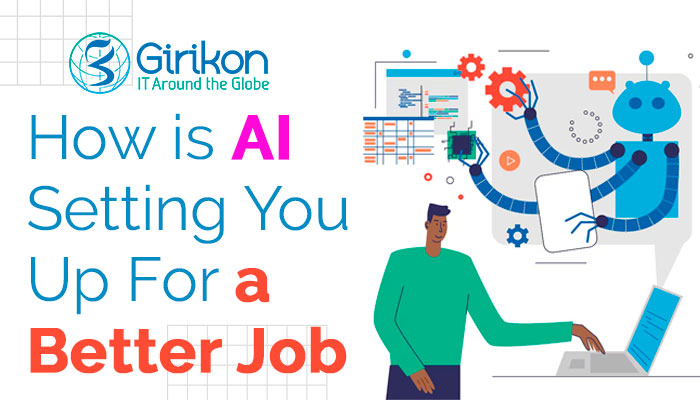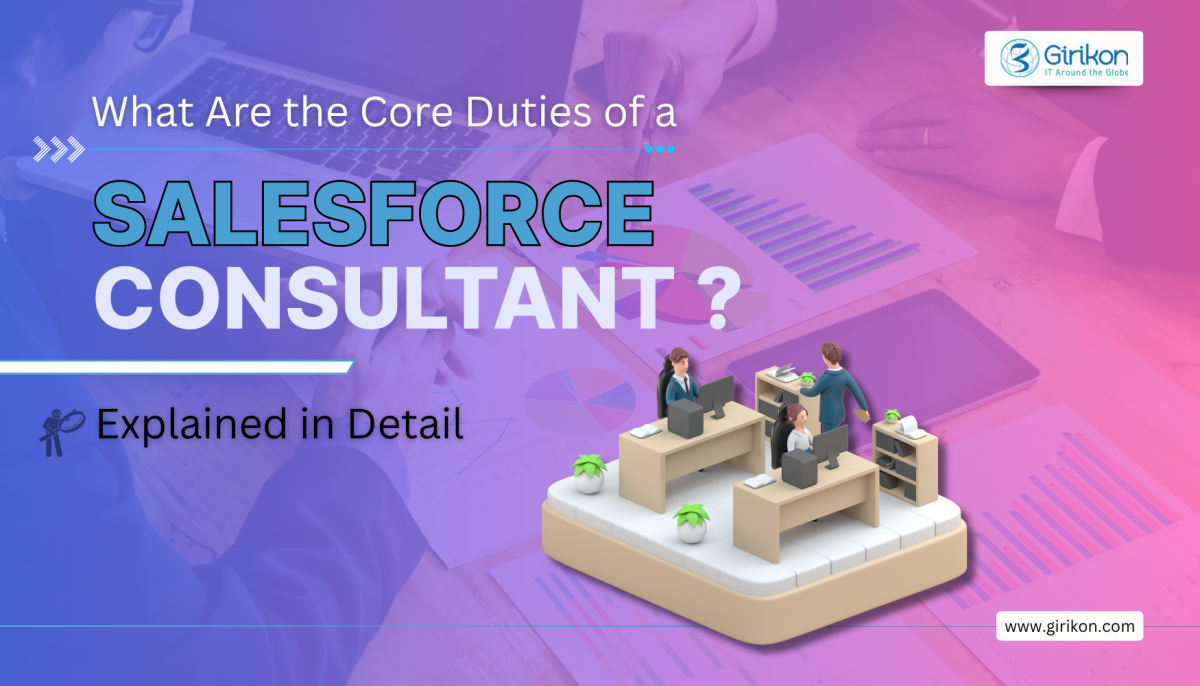Our Blogs
It’s an exciting time for knowledge workers. Many new work opportunities are opening up quickly in the AI-related workspace. Artificial Intelligence and the game-changing technology of generative AI are helping to create a range of new career options, starting from prompt engineers, and use case designers, to AI trainers. Our team of experts has compiled a list of a dozen new and upcoming AI-related roles, along with tips on how to prepare for these roles.

Everywhere. For everyone. Yes, that’s the scope of leveraging AI technologies in business. And that includes the job market as well.
The holistic view
According to a McKinsey report, generative AI has the potential to add over $4 trillion in value to the world’s economy pan-industry. This includes manufacturing, retail, financial services, telecom, construction, high tech, healthcare, and pharma. It will impact job functions such as sales, marketing, customer service, engineering, HR, and research and development.
While AI holds limitless promise for transforming businesses in the way they work, there is also an underlying current of uncertainty and fear around AI taking jobs away. In this article, we quash that myth and talk about how this new disruptive technology will, in fact, create a variety of new career opportunities for the global workforce. For instance, lucrative roles like prompt engineering, the art of creating effective prompts for GPT interfaces, and AI roles such as AI product manager are currently trending on popular job portals.
Salesforce recently sponsored an IDC-authored white paper where they surveyed 500 organizations that are currently using AI-powered solutions. The whitepaper concluded that over the next 12 months, we will witness a sharp rise in demand for data architects, ethical AI specialists, AI product designers, and AI solution architects. The report also predicts nearly 12 million new jobs will be created within the Salesforce ecosystem alone over the next six years. Now that’s a number business leaders and HR departments cannot ignore.
What you can do now
AI needs people to be at the helm of affairs for it to work effectively and deliver on the promise it holds. And the global workforce, across all levels across all industries, has the golden opportunity, at this very moment, to sharpen their existing skills and acquire new ones to grow with the economy.
The exciting thing about AI tools and solutions is that they are still in the early stages of deployment and are mostly democratized. So, if people have the will, they can learn on their own how to augment their current value. And the requisite resources are already there. Platforms such as Trailhead (from Salesforce), Coursera, Udemy, etc offer free and paid courses to certify you on AI-related skills.
AI will eliminate redundancy and create new roles
Let’s understand one thing very clearly. Yes, AI will probably eliminate repetitive tasks such as scheduling social media posts, going through resumes, examining data, answering common customer service questions, and composing and sending follow-up emails. But all this will free up a lot of time for workers to spend adequate time on strategic, creative, and productive tasks in their existing roles.
With the adoption of AI, workers will now have time to do actual work. If you’re a sales professional or work in customer service, you can now allocate more time to what matters – interacting with customers to nurture those relationships. If you work in marketing, you can spend more time crafting marketing strategies or working on creative projects. And if you work in legal or healthcare, you can leverage AI technology to research and analyze agreements or help interpret CT scans and X-rays.
While new AI jobs in engineering or data-related fields are obvious, new roles in healthcare, financial services, legal, construction, etc will evolve with the evolution of smart AI. AI will be like the sky, the background of everything else that happens over it.
12 new roles that may be created with the advancement in generative AI
Curious about AI and how it can augment your current skill set and role? Here are 12 opportunities to look out for. Some of these are already in the initial stages of existence while others are what our experts believe, will crop up in the near term. Do you see yourself in one of these in the future?
Prompt engineer
Prompt engineers are masters at composing prompts for AI tools such as GPT tools or chatbots. Writing great prompts is key to unlocking the effectiveness of generative AI. Some AI ambassadors refer to it as AI whispering. After all, you are basically guiding the AI tool to provide you with a creative answer to your prompt or question.
AI trainer
AI trainers work in the background to ensure the learning algorithms driving AI do what they are supposed to. AI gets better as it gets more and more data to play with. AI trainers prepare these data sets to teach the learning algorithms how to think and respond to user inputs (prompts) in a more human-like language. AI trainers also refine the data and direct engineering teams to achieve more relevant and accurate outcomes. In a nutshell, AI trainers teach AI tools on how to think, communicate, and be useful.
AI learning designer
As AI technology evolves rapidly (and we have only seen the tip of the iceberg), businesses will need workers to optimize individual learning at scale. AI learning designers assist businesses in training their workers on AI tools and systems, including training them on how AI copilots can complement their work. Not only that, they will go one step further to refine the very ways in which people learn. Businesses that have better learning frameworks and strategies will be in a better position to adapt to emerging AI technology.
AI instructor
As businesses continue to invest in AI tools and systems, they will also need people to train their employees on how to use them. AI instructors help people further their careers by teaching them the necessary AI skills even if they are currently not involved in AI. An AI instructor’s responsibilities include developing a curriculum, creating teaching methodologies, conducting hands-on classes, and providing a more holistic AI education.
Sentiment analyzer
While AI can understand and interpret natural language, it is still not human and does not possess empathy. AI cannot recognize nuances of language, particularly when we have so many, and cannot interpret human emotion. This is why a sentiment analyzer’s role is important. They leverage a sentiment analysis program to establish if data extracted from a public source such as social media comments or feedback is positive, neutral, or negative by identifying its emotional tone.
Stitcher
A stitcher’s role is a generic one. They use AI to stitch together a variety of skills across multiple roles into a single role. For instance, they leverage AI to combine modular apps and tools into a single workflow that delivers unique value to customers.
Interpersonal coach
This role, as the name suggests, is based on a soft skills development function. Interpersonal coaches help the digital workforce and the ones working with AI, to grow their interpersonal skills such as social intelligence, empathy, mindful listening, and managing face-to-face interactions. It’s similar to a soft-skills trainer, except that it's more focused on helping people who work in the background or mostly with computers.
Workflow optimizer
This role is critical for companies as it deals with the soul of any business – data. They leverage data and system intelligence to have a 360-degree view of a business and identify areas where AI could help workers be more productive. A workflow optimizer uses AI to analyze how people and teams work and identify productivity gaps to boost overall efficiency.
AI compliance manager
AI is still at a nascent stage and the regulations and guidelines are fluid and ever-changing. As they continue to get more refined and standardized, an AI compliance manager’s job is to make sure his company’s AI processes abide by existing regulations, guidelines, and ethical standards. They ensure that their organization’s data management practices are aligned with privacy laws and mitigate AI’s potential legal impact on the company.
AI security manager
AI technology can become dangerous if it gets into the wrong hands. The function of an AI security manager is to ensure AI systems are used with honesty and integrity. They also ensure sufficient guard rails are in place to protect against any threats and vulnerabilities.
Chief AI officer
The newest entrant in the C-suite league, the CAIO’s primary function is to guide and manage a holistic AI strategy for the organization. This includes ensuring the development and deployment of responsible and trusted AI systems across the organization.
Chief data and analytics officer
This role entails overseeing everything related to data and analytics in an organization. Depending on the size of the enterprise or the scale of AI being used by the company, this role is sometimes shared between two people, a chief data officer and a chief analytics officer.
How to prepare for new AI careers
With all of these AI opportunities opening up, it’s time to buckle up, commence training, and start having fun with some of the free AI tools. View these tools as someone who can help you to improve the way you work and how you do it.
With so many online learning platforms available at our fingertips, we can quickly start educating ourselves on AI-related technologies and upgrade our current skill set.
At Girikon, a Gold Salesforce Implementation Partner, we believe that if we embrace change and the opportunities that come with it, we open doors to new possibilities. The need of the hour is to be curious and bold. Connect with an expert today. Our team of certified Salesforce Consultants would be happy to guide you.

 +1-480-382-1320
+1-480-382-1320 +44-7428758945
+44-7428758945 +61-1300-332-888
+61-1300-332-888 +91 9811400594
+91 9811400594


















